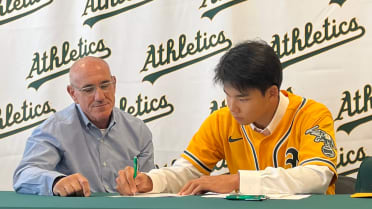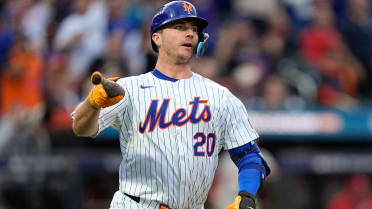Rocket gave Blue Jays a boost as free agent
Clemens captured two AL Cy Young Awards in two years with Toronto
Before bidding adieu to the Hot Stove season, we asked our 30 beat reporters to look back at their club's past and answer the following question: Who is the best free-agent signing in the team's history?
We narrowed the choices with the following parameters: The signings had to be multiyear contracts, to exclude fluky one-year deals and to focus on players who got real commitments. And contract extensions don't count. Only instances when every team in the league had a chance to bid on the player were allowed, including international free agents who received Major League contracts.
TORONTO -- The best free-agent signing in Blue Jays history is one that still evokes a lot of mixed emotions from the fan base more than 20 years later.
Roger Clemens was responsible for two of the greatest single-season pitching performances the organization has ever seen. His four-year deal worth $40 million was an absolute steal, but all that success was quickly overshadowed by the way he left town. Like much in life, there's a good and bad side to this story.
The Blue Jays were three years removed from their back-to-back World Series titles when they signed Clemens on Dec. 13, 1996. Clemens arrived with a chip on his shoulder following a pair of disappointing seasons in Boston, and he was looking to prove that there was still plenty left in the tank. The methods he allegedly took earned him a spot in the Mitchell Report, but in terms of his performance on the mound, there was no one better for the Blue Jays.
Clemens went a combined 41-13 with a 2.33 ERA en route to capturing the American League Cy Young Award during each of his two seasons in Toronto. Clemens led the AL in ERA, won the most games and struck out the most batters both seasons -- pitching's equivalent to the Triple Crown. Every fifth day, he became must-watch TV.
Many elite pitchers have passed through Toronto over the years: Pat Hentgen, Roy Halladay, Dave Stieb, Jimmy Key and Juan Guzman, to name a few. But nobody has matched what Clemens did in 1997. According to Baseball Reference, Clemens' WAR of 11.9 is the highest by anyone -- pitcher or position player -- in franchise history. Clemens' '98 season (8.1) ranks tied for third among pitchers behind Hentgen's '96 season (8.5).
Clemens' eye-popping numbers put him atop the baseball world in 1998, but the mood quickly turned sour north of the border. Clemens not only demanded a trade, but he also had a few specific organizations in mind, and it was only a matter of time before he ended up with the division-rival Yankees. And, of course, he was later named in the Mitchell Report on the use of illegal performance-enhancing drugs in baseball.
It wasn't all bad news for the Blue Jays. In return, Toronto acquired veteran left-hander David Wells, who would win 37 games over the next two years. Despite a high ERA, he still finished third in voting for the AL Cy Young Award in 2000. The Blue Jays also acquired valuable setup man Graeme Lloyd and infielder Homer Bush, who hit .320 with 32 stolen bases during his first season in Toronto.
Honorable mentions
Designated hitter Paul Molitor (three years, $13 million)
Molitor faced the unenviable task of replacing fan favorite Dave Winfield when he signed on Dec. 7, 1992. Toronto had just won the World Series, and the organization was getting hit with all kinds of criticism after letting Winfield, a World Series hero, get away. Molitor made everyone forget all about that by leading the AL with 211 hits while posting a .332 average and 22 homers. Molitor finished second in voting for the AL MVP Award in '93 and was even better during the strike-shortened '94 season.
Right-handed pitcher Jack Morris (two years, $10.85 million)
The second year of this deal never really worked out, but the Blue Jays got what they wanted and more out of the first. Morris led the AL with a 21-6 record and a 4.04 ERA in his first season with the Blue Jays and finished fifth in voting for the AL Cy Young Award. Prior to Morris' arrival in 1992, Toronto had not figured out a way to take the final step, and he played a major role in getting it to the postseason. The Blue Jays would go on to win it all two years in a row. Another honorable mention here goes to Dave Stewart, who joined Toronto on a two-year deal following the '92 season, but the edge goes to Morris because Stewart had a 4.44 ERA in his first year with the team and a 5.87 ERA in his second.
Outfielder Joe Carter (three years, $19 million)
Players who signed extensions were not allowed to be considered for this list unless they were free agents at the time of the deal. That's the situation Carter found himself in after leading the Blue Jays to the World Series in 1992. It was down to Kansas City and Toronto, but the Royals were offering more money and a longer-term deal. As the legend goes, Carter woke up one December morning to birds chirping after seeing Devon White and SkyDome in a dream. He took it as a sign. Toronto has received better returns -- at least in terms of stats -- from other players, but none of that really matters because of one thing: Carter hit the most iconic home run in franchise history, and that moment alone makes this one of the top signings in club history.
Gregor Chisholm has covered the Blue Jays for MLB.com since 2011. Follow him on Twitter @gregorMLB and Facebook, and listen to his podcast.



